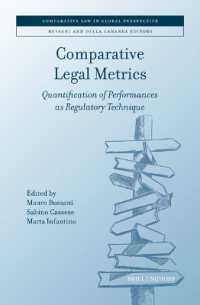- ホーム
- > 洋書
- > 英文書
- > Science / Mathematics
Full Description
In recent years, significant effort has been put into developing formal verification approaches in both academic and industrial research. In practice, these techniques often give satisfying results for some types of circuits, while they fail for others. A major challenge in this domain is that the verification techniques suffer from unpredictability in their performance. The only way to overcome this challenge is the calculation of bounds for the space and time complexities. If a verification method has polynomial space and time complexities, scalability can be guaranteed.
In this monograph, Polynomial Formal Verification (PFV) of arithmetic circuits is evaluated. The importance and advantages of PFV are discussed, and subsequently it is proved that PFV of different types of arithmetic circuits, including adders, multipliers, and Arithmetic Logic Units (ALUs), is possible. Furthermore, the exact upper-bound space and time complexities of verifying these circuits are calculated.
Contents
1. Introduction
2. Background
3. Polynomial Formal Verification of Adders
4. Polynomial Formal Verification of Multipliers
5. Polynomial Formal Verification of ALUs
6. Conclusion
References








